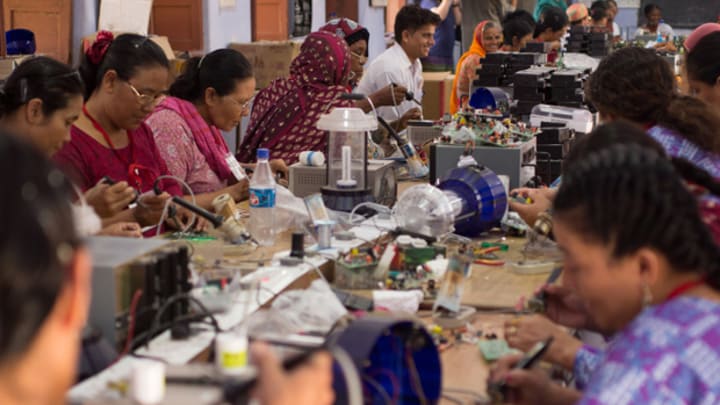
If we listen and act on what Mahatma Gandhi had to say on development, the focus is very simple. He said the ultimate solution for fighting poverty was not mass production but production by the masses.
If we are to contain massive migration, prevent the rich indigenous knowledge, culture, village skills and practical wisdom in traditional societies from disappearing into the slums of megacities and protect and improve the quality of life of villages — then we have to apply the Gandhian model globally. We have to trust and believe in ordinary people to offer simple sustainable solutions. The view that the millions of families living in marginalized, neglected, poor or exploited communities who cannot read or write are unable to think clearly for themselves or act responsibly is wrong.
Take for instance the role of solar energy as one solution to addressing climate change. What we definitely don’t need are $1,000-a-day consultants from the World Bank and international donor agencies producing voluminous unreadable reports telling developing countries the infinite advantages of Western business models.
The Gandhian solution is entirely based on practical common sense. It is absurd to force an urban solution to a rural problem. If we don’t involve local communities in decision-making from the very beginning then all of the top down multimillion dollar projects currently being planned globally in the name of the rural poor will be colossal failures. Guaranteed.
The Gandhian model does not believe in subsidizing businesses to produce cheaper solar panels and accessories. To force the rural poor to follow a business model and live sustainably is ludicrous. Interventions need to focus on empowering local communities to provide services rather than supporting the businesses supplying solar products. The Gandhian model is a partnership model that believes in inclusion and development with dignity where everyone is treated as equals and everyone benefits. The extent to which we can manage this partnership will be one measure of success.
Often traditional business models focus purely on a profit motive and are missing an element of compassion. Those models can also increase inequality between the rich and the poor, the haves and the have-nots. There is not one remote village in the world where a business model has ensured the whole village benefits and is 100 percent electrified. There is not one nonelectrified village where a business model can establish a maintenance system for solar lighting at the village level because it is not cost effective. The poor have to travel to the cities several hours away at their own cost to have repairs done on their solar lights or systems.
We have traveled to remote nonelectrified villages in 34 of the least developed countries in Africa. The World Bank version of a business model in Africa is small petty shopkeepers being called entrepreneurs selling poor quality “trinkets” made in China and passing them off as solar lamps that stop working after a few months. The poor people of Africa, and indeed the world, deserve better.
When we went to a remote nonelectrified village in the middle of the Kalahari Desert in Botswana and we told them we were bringing Indian manufactured solar panels and solar lanterns we received an unexpected standing ovation from the whole village.
With the Gandhian partnership model the whole village is involved when the fixed solar systems are installed in every house. There is a continuing relationship filled with warmth, companionship, intimacy, trust and sharing — something that cannot be bought or sold as a commodity.
The Gandhian model of training is unique and focuses on selecting and training semiliterate rural women to be solar engineers. We should never underestimate the competence and confidence of illiterate rural women to pick up the most sophisticated of solar technologies and make them into solar engineers. The impossible is possible in six months.
The key is empowering women to assemble solar systems in villages and training them to be entrepreneurs who fabricate, install, repair and maintain solar systems in their own villages. New subsidies — those that focus on lowering the costs of solar systems directly on condition the poor pay for the repair and maintenance will be more effective and create dignified work. We can demonstrate how solar-electrified villages can be self-sufficient, relying on the skills and ingenuity of the local communities to build and maintain systems. This is how we will measure success.
Join the Devex community and access more in-depth analysis, breaking news and business advice — and a host of other services — on international development, humanitarian aid and global health.




